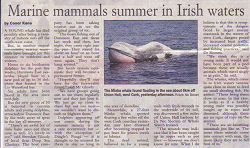
Irish Examiner, August 2007
by Conor Kane
…Meanwhile, a 27-foot minke whale, spotted floating a few miles off the West Cork coastline yesterday, may have drowned after becoming trapped in pot lines for prawn creels or lobster.
The dead animal, believed to be a young male with fresh wounds to the underside of its tail, was discovered a few miles off Union Hall harbour by Dr Nic Slocum of Whale Watch West Cork…
"…The wounds may indicate that it has been caught up in ropes such as pot lines - however we don't know for sure. What I do believe is that this is symptomatic of the dangers faced by large marine mammals in the waters of West Cork, dangers posed by increased boat traffic, increased coastal pollution and fishing practices…" said Dr Slocum.
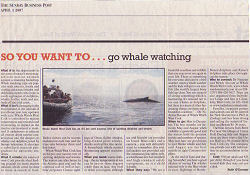
Sunday Business Post, April 2007
by Ruth O'Connor
…Whale Watch West Cork is committed to marine conservation and research and to ensuring its impact on the environment is minimal. It endeavours to educate all visitors about marine conservation and the dangers to whales and dolphins posed by human behaviour. It also runs a subsidised research programme for university students…
…Whale Watch West Cork has an 84 per cent success rate of spotting dolphins and whales. The waters are also home to the Atlantic grey seal and the common seal as well as harbour porpoises. Chance sightings of Orcas (killer whales), long finned pilot whales, sharks and turtles also occur. A humpback whale named Boomerang appears occasionally…
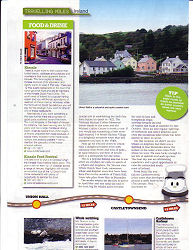
Motor Caravan, March 2007
by Sally Coffey
…This is a popular fishing area but it was other sea creatures we came in search of - whales and dolphins. Nic Slocum runs Whale Watch West Cork, catamaran whale and dolphin tours that leave from Reen Pier on the outskirts of Union Hall. Tours take place from May to December.
The minke whales are the first to arrive in April/May and stay until the end of the year, big fin whales arrive towards the end of June and humpbacks begin arriving towards the end of August and build in numbers by late October. There are also regular sightings of bottlenose and Risso's dolphins and even the occasional killer whale has been known.
On this occasion we did not see any whales or dolphins but there was a sighting of four blows above the water a few miles from where we were. We were lucky enough to see lots of seabirds and seals up close. The boat trip was an exhilarating experience and a great opportunity to view the untouched south coast of Ireland…
|
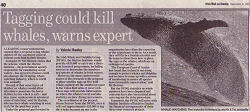
Irish Mail on Sunday, December 2007
by Valerie Hanley
A leading conservationist has warned that a proposal to tag whales sighted off the southwest coast of Ireland could lead to their demise.
Zoologist Dr Nic Slocum claims that the scheme which the Marine Institute - the government agency responsible for monitoring ocean waters - has agreed to finance could also damage the fledgling whale watching industry, which is worth 7 million euro annually.
"…Breach of the outer layer (of blubber on whales) would allow infection to penetrate the lower blubber layers which is soft - and may cause septicaemia in advanced cases of infection…" said Dr Slocum, who has been whale watching in West Cork for the past four years…
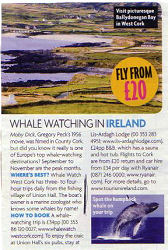
Woman's Own, September 2007
Jane Hayward
…Moby Dick, Gregory Peck's 1956 movie, was filmed in county Cork, but did you know it really is one of Europe's top whale watching destinations?
Whale Watch West Cork has three to four hour trips daily from the fishing village of Union Hall. The boat's owner is a marine zoologist who knows some whales by name…
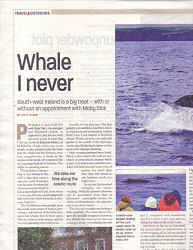
The Scotsman Magazine, May 2007
by Pete Clark
…At Reen Pier, three miles outside Union Hall, we met Nic Slocum, who runs Whale Watch West Cork, and he explained to us how it was that the boat could not go out, even though the sea looked in benevolent mood. Six to ten miles out, where the whales are, the water would not be so welcoming, and the chances of spotting even animals as large as these would be tiny…
…Instead we went up to Nic's cliff top house, which commands a wonderful view of the coastline, including the unspoilt miniature paradise of Rabbit Island, and sipped a large Irish whiskey while watching the sun slowly going down in the west…

Daily Mail, November 2006
by Lynne Kelleher
Zoologist Nic Slocum expressed concern for the mammals after an upsurge in the amount of leisure craft in Ireland over the last five years. Dr Slocum, who runs Whale Watch West Cork, sees many dolphins with cuts and bruises from scrapes with boats in the water. He said: "…There has been a huge increase in the amount of recreational boats between Cork and Baltimore in the last few years…" "…There are fast boats and jet skis going around at very high speed, especially in the summer…"
|
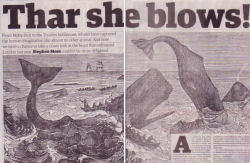
Guardian, January 2007
by Stephen Moss
…They represent timelessness, space, improbability; they are the largest creatures ever to evolve, demonstrate great intelligence, live in complex societies, use tools, cooperate with each other, can recognize themselves, have a lifespan at least as long as ours and can speak to each other, communicating through what zoologist Dr Nicholas Slocum, who runs Whale Watch West Cork, calls "low frequency grunts and whines" over vast distances, even across oceans.
"There is an air of mystique about whales," says Slocum. "They live in an environment very alien to us." He takes groups out on his boat in search of minke, fin and humpback whales…"you only see them on their own terms" he says "That always strikes me as rather attractive." He describes this communing with whales as "mystical."…
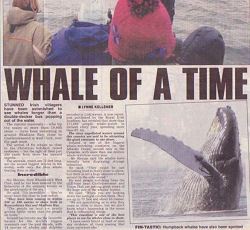
Star Sunday, December 2005
by Lynne Kelleher
…Nic Slocum from Whale Watch West Cork said, "…they could be following food close inshore but there is not a huge amount showing on the (boats) echo sounder…" A new report recently published by the Royal Irish Academy has revealed that more than 177,000 people go whale and dolphin watching in Ireland every year spending more than 7.1 million euro…
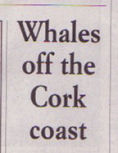
Irish Examiner November 2006 by Áilín Quinlan
…Classed as an endangered species, the (fin) whales, which grow to 75 feet in length as adults and can weigh up to 65 tons have been spotted less than a mile from the shore, according to zoologist Nic Slocum, director of Whale Watch West Cork, which monitors the movement of whales. "…some people are watching from the headlands and we're going out on the boat to look at them…" said Mr Slocum who, along with interested whale watchers, has been monitoring the whale's movements since they appeared some days ago…

Irish Daily Mail, November 2006
by Lynne Kelleher
…Reckless drivers of speedboats and jet skis are injuring and frightening whales and dolphins in Irish waters, according to a marine expert. Zoologist Nic Slocum expressed concern for the mammals after an upsurge in the amount of fast leisure craft in Ireland over the past five years. Dr Slocum, who runs Whale Watch West Cork, sees many dolphins with cuts and bruises from scrapes with boats in the water. He said "…there has been a huge increase in the amount of recreational boats between Cork and Baltimore in the last few years…" Dr Slocum also believes the mammals don't like the noise of the powerful boats…noise travels much quicker through water. "…In my experience the whales don't like the sound of engines. If I turn my engines off we have much better sightings of whales..." He said he believes most boat owners would slow down if they realized the risk to the marine life…
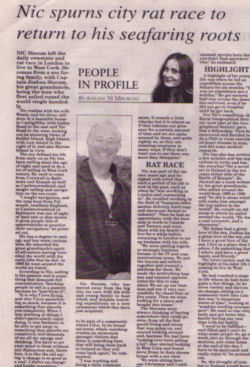
Southern Star, July 2005
by Aingeal Ni Mhurchu
…Nic Slocum left the daily commute and rat race in London to live in West Cork. Nic resides with his wife Wendy and their three children in a beautiful house in Carrigillihy with stunning views over rabbit Island. "…My father had a great love of the sea, Joshua had a great love of the sea and I have a great love of the sea. I live in a place that I adore, I do something that I adore and I have great family and friends…"
|
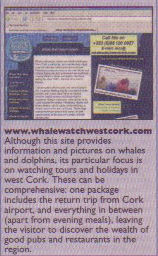
Irish Examiner
August 2006
by John Hearne
…Whale watching is associated with more exotic locations than Cork or Clare but operators claim Ireland has the potential to become a world-class whale-watching destination. Nic Slocum of Whale Watch West Cork has been organizing whale and dolphin watching trips in West Cork for the past three years. "…Two years ago this coming November the whale watching, without a shadow of a doubt, was world class…" he says "…I would say as good as anywhere in the world…"
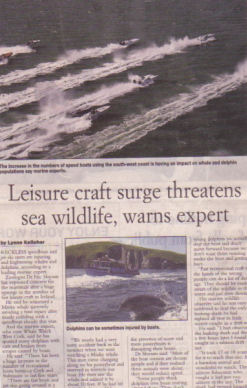
Irish Examiner, November 2006
by Lynne Kelleher
…Reckless speedboat and Jet Ski users are injuring and frightening whales and dolphins, according to a leading marine expert. Zoologist Dr Nic Slocum has expressed concern for the mammals after a huge upsurge in the number of fast leisure craft in Ireland. He said, he has witnessed a minke whale narrowly avoiding a fatal injury after nearly colliding with a speedboat already this year. The marine expert, who runs Whale Watch West Cork, said he has spotted many dolphins with cuts caused by boats…
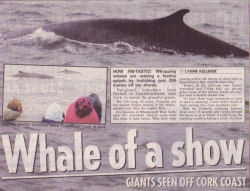
News of the World, December 2005
by Lynne Kelleher
…Delighted onlookers have flocked to Castletownshend, West Cork, to watch the graceful giants. The 75ft long 65 ton Finbacks are the second largest whales in the world - smaller only than the mighty Blue. Nic Slocum of Whale Watch West Cork, said, "…it's incredible. They have never been this close to land before. They have been coming within 200 metres of the shore both in Rosscarbery Bay and Scullane Bay…"
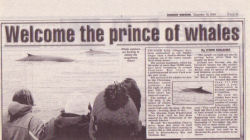
Sunday Mirror, December 2005
by Lynne Kelleher
"…Nic Slocum from Whale Watch West Cork said he has been amazed by the behaviour of the animals. It's incredible. They've never been in this close to land before. They have been coming in within 200 or 300 metres of the shore both in Rosscarbery Bay and Scullane Bay…" "…The whales have been displaying some strange behaviour this year…" "…They could be following food but everything seems to be happening later in the year…"
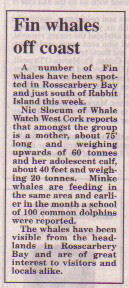
Southern Star
November 2006
…A number of fin whales have been spotted in Rosscarbery Bay just south of Rabbit Island this week. Nic Slocum of Whale Watch West Cork reports that amongst the group are a mother about 75 feet long and weighing upward of 60 tons and her adolescent calf…
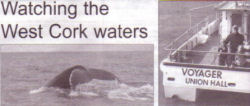
Marine Times, August 2005
by Carol Gilbert
|


















